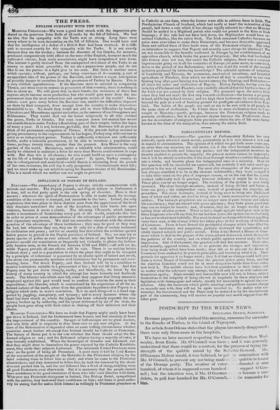PARLIAMENTARY REFORM.
BLACKWOOD'S MAGAZINE—The question of Parliamentary Reform has very naturally again attracted much notice, particularly as it is now ahnost a new one in regard to circumstance. The opinion of it which we put forth some years ago, on more than one occasion, we still retain, viz. if the close borough members be divided into two hostile and balancing parties, and the independent members be thereby enabled to govern the majority, the present system cannot be improved ; but it will be utterly indefensible if the close borough members combine themselves into a whole, and thereby place the independent ones in a minority. How far this question will be successful we cannot tell, but certainly it will meet small op. position in the way of argument. The most able champions of the present sys- tem always admitted it to be in the abstract indefensible; they were compellol to take their stand on the plea of improper season, oa on the one that the system worked sufficiently well in practice, however defective it might be in theory. These pleas can be DO longer urged. The working of the system is now totally reversed. The close borough members, instead of being divided and halanud, form one party ; the independent ones, instead of governing the majority, are powerless. The close boroughs, instead of being used to bring into Parliament men of talent and virtue, are used to bring into it mere mercenaries who possess neither. The borough proprietors are no longer men of pure honour and inflexi- ble consistency; they are stained with gross apostacy ; they have given proof that they can no longer be trusted ; and, of course, they are no longer worthy of re- taining their elective power. There is not a single upright intelligent man in the three kingdoms who will say that, for the last five veal's, the system has worked well, or has not worked most balefully. The most destructive change which these appalling times have seen, is the change which has taken place in tile working of the House of Commons. From it have flowed the pestilential changes which have tilled the land with insolvency and pauperism, partially destroyed the constitution, and vitally injured religion and public morals. From it has flowed a House of Com- mons which is deaf to the prayers of time wronged and distressed, which disregards the petitions of the country, and on which public opinion cannot make the least impression. Out of Parliament, the question will find few enemies. Those who, until recently, opposed reform, did so to prevent the changes and innovations from being made which have been made ; they did so to prevent the Bouse of Commons from embracing its present principles, and becoming what it is. Their grounds for opposing it no longer exist ; they feel that no change could well give them a worse House of Commons than the present system gives them, and that the elective franchise could not be in more dangerous, hands than those widen now hold it. The middle classes have lost their confidence in their rulers, and no matter what the reformers may attempt, they will only look on with sullen con- temptuous apathy. High-minded and honourable men will not, in future, subject themselves to the indignity of being classed in turpitude by these ministers and legislators with demagogues and rebels, merely for associating to uphold the con- stitution. After the treatment which public meetings and petitions against change so recently met with, they will not be again resorted to. No matter what ex- tremities the Government amid the Peers may be reduced to by the revolutionary part of the community, they will receive no popular and moral support from the other part.


















 Previous page
Previous page